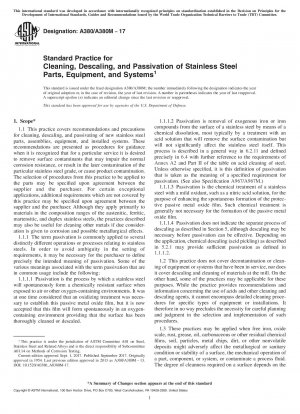ASTM A380/A380M-17
Standard Practice for Cleaning, Descaling, and Passivation of Stainless Steel Parts, Equipment, and Systems
- Standard No.
- ASTM A380/A380M-17
- Release Date
- 2017
- Published By
- American Society for Testing and Materials (ASTM)
- Latest
- ASTM A380/A380M-17
- Scope
-
1.1 This practice covers recommendations and precautions for cleaning, descaling, and passivating of new stainless steel parts, assemblies, equipment, and installed systems. These recommendations are presented as procedures for guidance when it is recognized that for a particular service it is desired to remove surface contaminants that may impair the normal corrosion resistance, or result in the later contamination of the particular stainless steel grade, or cause product contamination. The selection of procedures from this practice to be applied to the parts may be specified upon agreement between the supplier and the purchaser. For certain exceptional applications, additional requirements which are not covered by this practice may be specified upon agreement between the supplier and the purchaser. Although they apply primarily to materials in the composition ranges of the austenitic, ferritic, martensitic, and duplex stainless steels, the practices described may also be useful for cleaning other metals if due consideration is given to corrosion and possible metallurgical effects.
1.1.1 The term passivation is commonly applied to several distinctly different operations or processes relating to stainless steels. In order to avoid ambiguity in the setting of requirements, it may be necessary for the purchaser to define precisely the intended meaning of passivation. Some of the various meanings associated with the term passivation that are in common usage include the following:
1.1.1.1 Passivation is the process by which a stainless steel will spontaneously form a chemically resistant surface when exposed to air or other oxygen-containing environments. It was at one time considered that an oxidizing treatment was necessary to establish this passive metal oxide film, but it is now accepted that this film will form spontaneously in an oxygen-containing environment providing that the surface has been thoroughly cleaned or descaled.
1.1.1.2 Passivation is removal of exogenous iron or iron compounds from the surface of a stainless steel by means of a chemical dissolution, most typically by a treatment with an acid solution that will remove the surface contamination but will not significantly affect the stainless steel itself. This process is described in a general way in 6.2.11 and defined precisely in 6.4 with further reference to the requirements of Annex A2 and Part II of the table on acid cleaning of steel. Unless otherwise specified, it is this definition of passivation that is taken as the meaning of a specified requirement for passivation. (See also Specification A967/A967M.)
1.1.1.3 Passivation is the chemical treatment of a stainless steel with a mild oxidant, such as a nitric acid solution, for the purpose of enhancing the spontaneous formation of the protective passive metal oxide film. Such chemical treatment is generally not necessary for the formation of the passive metal oxide film.
1.1.1.4 Passivation does not indicate the separate process of descaling as described in Section 5, although descaling may be necessary before passivation can be effective. Depending on the application, chemical descaling (acid pickling) as described in
ASTM A380/A380M-17 Referenced Document
- ASTM A967/A967M Standard Specification for Chemical Passivation Treatments for Stainless Steel Parts
- ASTM F21 Standard Test Method for Hydrophobic Surface Films by the Atomizer Test
- ASTM F22 Standard Test Method for Hydrophobic Surface Films by the Water-Break Test
- ISO 14644-1 Cleanrooms and associated controlled environments - Part 1: Classification of air cleanliness by particle concentration (includes Redline Version)
- ISO 14644-2 Cleanrooms and associated controlled environments - Part 2: Monitoring to provide evidence of cleanroom performance related to air cleanliness by particle concentration (includes Redline Version)
ASTM A380/A380M-17 history
- 2017 ASTM A380/A380M-17 Standard Practice for Cleaning, Descaling, and Passivation of Stainless Steel Parts, Equipment, and Systems
- 2013 ASTM A380/A380M-13 Standard Practice for Cleaning, Descaling, and Passivation of Stainless Steel Parts, Equipment, and Systems
- 2006 ASTM A380-06 Standard Practice for Cleaning, Descaling, and Passivation of Stainless Steel Parts, Equipment, and Systems
- 1999 ASTM A380-99(2005) Standard Practice for Cleaning, Descaling, and Passivation of Stainless Steel Parts, Equipment, and Systems
- 1999 ASTM A380-99e1 Standard Practice for Cleaning, Descaling, and Passivation of Stainless Steel Parts, Equipment, and Systems

Copyright ©2024 All Rights Reserved